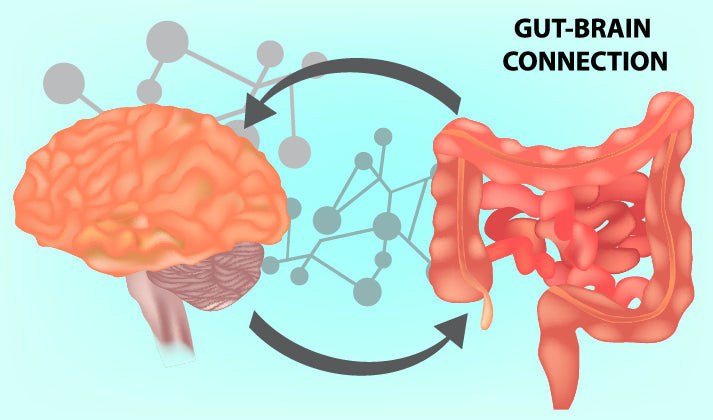Why What You Eat Affects How You Feel: the Brain-Gut Connection
Posted by JOANNA C

We have heard the old adage “You are what you eat,” but the more appropriate saying might be “You are what eats what you eat”. Each of us has approximately 100 trillion bacteria in our intestinal tract. The bacteria comprise a large amount of our immune system and helps digest foods, such as starchy carbohydrates that were not completely broken down before reaching the large intestine. We are learning more about the role our intestinal bacteria play in our wellbeing and health—but what if the bacterial population we host is lacking in the correct microorganisms?
Despite eating a well-balanced diet and avoiding the high sugar and inflammatory diet that has become the norm for America, some individuals struggling with low moods may be unable to achieve a state of balance within their bacterial population because certain strains are overgrowing or absent. It is also believed that development in early childhood and method of delivery at birth effects our microbiome population for the rest of our lives.
The gut-brain axis is a complicated network that links the colonies of bacteria in our gut to our nervous system and the brain. Some notable microorganisms that have been proven to directly produce metabolites that interact with neurochemistry are Bifidobacterium and Lactobacillus which synthesize GABA (gamma-aminobutyric acid) from monosodium glutamate; Escherichia coli (e-coli), Saccharomyces and Bacillus make norepinefrin; Streptococcus, Esherichia, Candida and Enterococcus make serotonin; and dopamine is produced by Serratia and Bacillus.
Stress can directly result in alteration of the microbiome balance. Animals studied during biological stresses such as having their mother taken away showed a drop in Bifidobacterium and Lactobacillus colonies.
Antibiotics alter the balance of gut bacteria by eradicating harmful bacteria and will also destroy the positive, balancing bacteria. Other non-antibiotic drugs such as acid-reducers, blood pressure medications, anti-psychotics and even some chemotherapy drugs have inhibited bacteria from growing that are present in normal and healthy guts.
The medications we take into our bodies affects the balance of the gut bacteria we have, as well as the food we eat.
What Can You Do to Have a Healthy Gut Population?
Eating a diet that is minimally processed and full of whole and nutrient-dense foods is one of the best ways to keep your gut’s microbiome in balance. Reducing your intake of sugary foods (which the harmful bacteria thrive on) and avoiding antibiotics when possible is one of the first things you can do to support a healthy flora.
Fermented foods and beverages, such as kimchi, sauerkraut, yogurt, kefir, and kombucha will also provide a good deal of beneficial bacteria to your intestinal microbiome. Taking a broad-spectrum probiotic supplement with both Lactobacillus and Bifidobacterium is also an effective way of keeping your gut bacteria well-balanced.
Overall, being aware of the gut-brain connection can help you understand what foods are good for both your body and your psychological well-being. Simply making healthier choices can often give you a better, more positive mood, and supplementing with probiotics can be a lot gentler than other mood interventional methods, such as pharmaceuticals. However, probiotics can only do so much, and if pharmaceuticals are necessary for your individual health and well-being, you will need to respect your emotional health enough to work with the treatment plan that your physician has provided for you. Taking a probiotic in conjunction with other interventional methods can reduce the risk of damage to your gut bacteria population that some medications may cause, and it will also help you feel better overall, which is a win-win situation.

